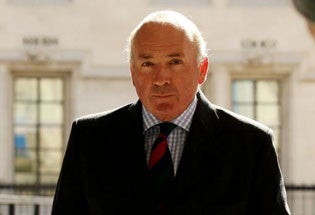Army 'was close to seizing up', Iraq inquiry told

Britain's military commitments in Iraq and Afghanistan brought the Army close to the point of "seizing up", a former head of the service said today.
General Sir Richard Dannatt said the decision to deploy a task force to Helmand in 2006 at a time it was facing worsening insurgency in Iraq represented a "perfect storm" for the Army.
Giving evidence to the official Iraq Inquiry, he disclosed that he had written to the then defence secretary Des Browne to warn him that morale was "fragile" and could lead to a potentially devastating exodus of personnel from the service.
Gen Dannatt said he had been surprised to learn of the decision in 2004 to send British troops to Helmand, even though he was at that time the commander of the Allied Rapid Reaction Corps which was due to be deployed.
"'Where did that come from' was my reaction," he said.
By the time he took over as the Chief of the General Staff in 2006 - the year the Helmand taskforce was actually deployed - he found himself in charge of an Army that was "running hot".
"You can run hot when you are in balance and there is enough oil sloshing around the engine to keep it going. When the oil is thin, or not in sufficient quantity, the engine runs the risk of seizing up," he told the inquiry.
"I think we were getting quite close to a seizing-up moment in 2006."
He said that on taking up his appointment he had written a lengthy letter to Mr Browne setting out in detail his concerns about how fragile morale had become.
"My biggest concern was that that fragility could be turned into a sharp rise in exits from our trained manpower akin to going over a cliff edge," he said.
"Once your manning has begun to plummet we would have been in all kinds of trouble trying to man two operations with units that were not fully manned. That would have spiralled into something of a nightmare."
Commanders had been worried they would not be able to withdraw troops as quickly had been hoped from Iraq following the invasion in 2003, while at the same time having to find additional forces to deploy to Afghanistan.
"We could see that perfect storm coming to fruition in about the middle of 2006 and I would contend that it did," he said.
The decision by Tony Blair to commit UK troops to Helmand was "reasonable" when it was made in 2004, he said, but by 2006 the situation had changed as the insurgency had taken hold in southern Iraq.
Despite the worsening situation in Afghanistan, Gen Dannatt acknowledged that there had been no reconsideration of the decision to go into Helmand.
"Maybe that was an error," he said.
His predecessor as head of the Army, General Sir Mike Jackson, told the inquiry that by that time there was so much momentum behind the Helmand deployment it was difficult to draw back.
"I think the view was we could not suddenly put up our hand and say, 'We can't do this in Afghanistan'," he said.
"Because it was not just a matter for us. It would have been the whole Nato effort in that country which would have been quite severely disrupted."
He said that he would have liked to have sent more than the 3,500 troops originally deployed, but said that it would have created too much pressure on the Army.
"I would have preferred to see a brigade go into Afghanistan in the beginning, but I think that would have been too much," he said.
Gen Dannatt disclosed that he had only one one-to-one meeting with Mr Blair during his time as Chief of the General Staff.
Asked whether he was confident that his concerns were being passed on by Mr Browne and the Chief of the Defence Staff, Air Chief Marshal Sir Jock Stirrup, he replied: "They told me they were."
Gen Dannatt strongly criticised the failure to find a replacement for the lightly-armoured Snatch Land Rovers which proved highly vulnerable in Iraq and Afghanistan.
"It remains unsatisfactory that it is only now that we have closed with the issue," he said. "We worked round the problem, we didn't actually confront the problem."
He said that a programme to acquire a new family of armoured vehicles known as the Future Rapid Effects System (Fres) had fallen victim to "internal machinations" within the Ministry of Defence, with the money going to Royal Navy's two new aircraft carriers.
The inquiry also released newly declassified documents which showed that Gen Jackson warned five years ago that British forces in Iraq were suffering from a lack of helicopters.
"Our support helicopter fleet is creaking badly. JHF-I (Joint Helicopter Force Iraq) is struggling to meet its tasks even with rigorous prioritisation," he wrote.
"The overall picture is one of an SH (support helicopter) force ill-matched to support current operations."
The inquiry was adjourned to Friday.
Subscribe to Independent Premium to bookmark this article
Want to bookmark your favourite articles and stories to read or reference later? Start your Independent Premium subscription today.

Join our commenting forum
Join thought-provoking conversations, follow other Independent readers and see their replies